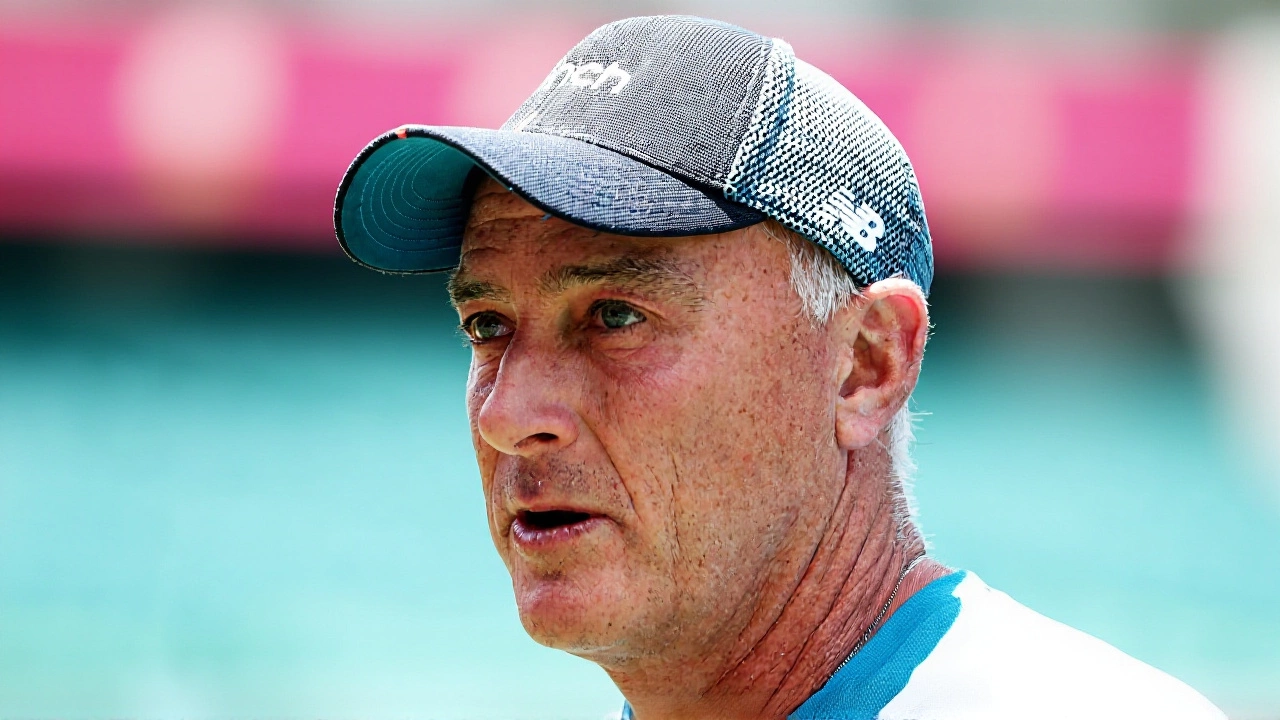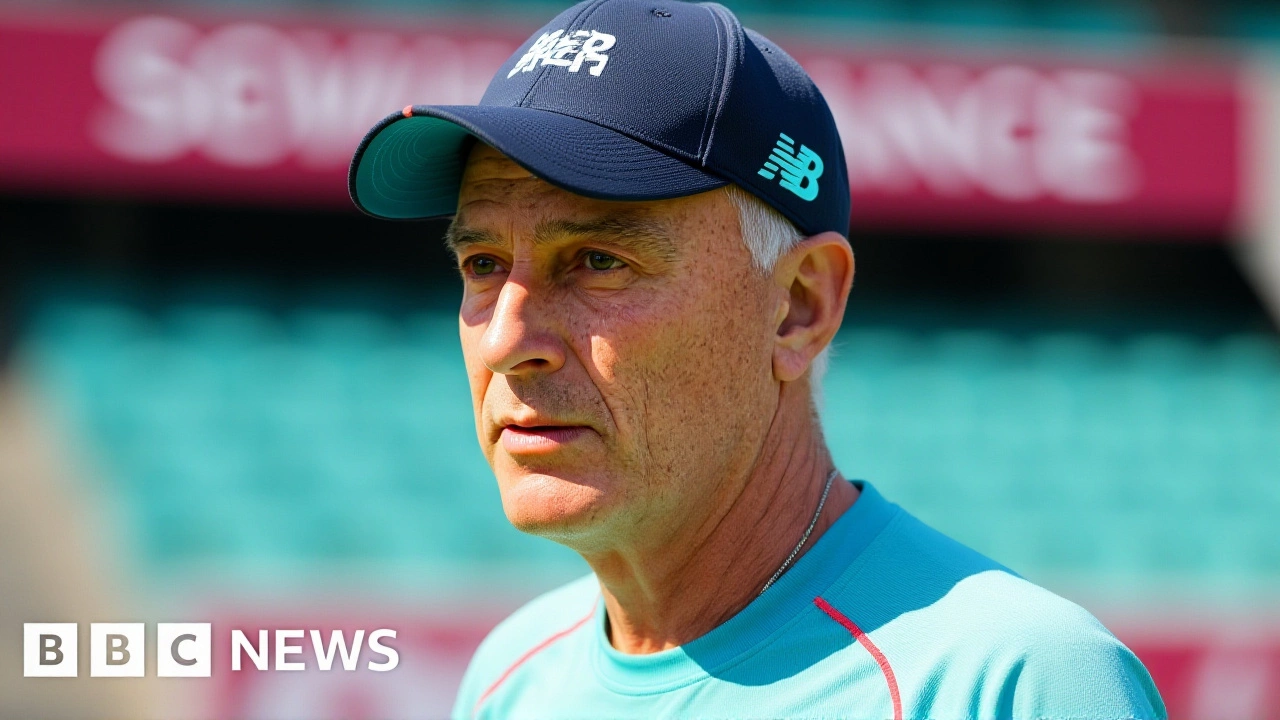When Graham Thorpe died by suicide in August 2024 at age 55, it wasn’t just the end of a life — it was the collapse of a man who had spent nearly three decades inside the cricket family. His widow, Amanda Thorpe, told the Surrey Coroner’s Court inquestWoking in July 2025 that he would still be alive if the England and Wales Cricket Board (ECB) had offered even a fraction of the support he needed after being fired in early 2022. It’s not just a tragedy. It’s a systemic failure.
The Fall From Grace
Graham Thorpe wasn’t just a player — he was a pillar of English cricket. He played 100 Test matches between 1993 and 2005, scoring 6,744 runs at an average of 44.66. He stood tall in the middle during some of England’s darkest years, most famously anchoring the 2001 Ashes series in Australia with a legendary 118 at Adelaide. After retiring, he became England’s batting coach, a role he held with quiet authority. Then came the 4-0 Ashes drubbing in Australia during the 2021-22 tour. By January 2022, the series was over. By March, Thorpe was out of a job.
That’s when the descent began. According to testimony from Amanda Thorpe, her husband’s identity — his purpose — was tied to cricket. He didn’t just lose a job. He lost his tribe. His counsellor, in March 2022, wrote a formal recommendation: Thorpe needed residential mental health care. Not outpatient sessions. Not phone calls. A full-time, structured environment. It was ignored. No one from the ECB followed up. No one called. No one reached out.
A Cry for Help, Left Unanswered
Amanda described watching her husband unravel. He stopped speaking at meals. He’d sit for hours staring at old match footage. He stopped going out. In late 2022, he made a suicide attempt — a detail confirmed by the coroner but not widely reported until the inquest. "We asked for help," she said, voice breaking. "I knew he needed more than that. And it wasn’t forthcoming."
The ECB’s response? A bland statement saying they’d "met with Amanda to discuss her concerns." No apology. No explanation. No details about what support — if any — they offered. No mention of the counsellor’s recommendation. No acknowledgment that they had a duty of care to a man who had given them 30 years of his life.
Coroner Jonathan Stevens didn’t mince words. "His exit from the role had a devastating effect," he said. "He had lost his cricket family." That phrase — "cricket family" — isn’t poetic fluff. It’s the truth. Cricket in England, especially at the national level, operates like a tight-knit clan. Coaches aren’t employees. They’re part of the lineage. To be cast out without transition is to be exiled.

What Could Have Been Done
Other sports have frameworks for this. The NFL has a player transition program. The NBA offers mental health liaisons after retirement. Even in rugby, dismissed coaches receive counselling packages. Cricket? Nothing. Not even a letter. Not even a call from the head coach. Thorpe was left alone with a grief he couldn’t articulate — the grief of being discarded after a lifetime of service.
Amanda Thorpe put it plainly: "It was just too much — the cliff, the whole mental breakdown of ‘I am no longer in that family.’" She didn’t say he was weak. She said the system was broken. And she’s right. If a player gets a psychological evaluation after a concussion, why doesn’t a coach get one after being fired? If a retired athlete gets access to financial advisors, why doesn’t a coach get access to therapists?
The Ripple Effect
This isn’t just about Graham Thorpe. It’s about every assistant coach, every fitness trainer, every analyst who works behind the scenes for the ECB — and every other sporting body that treats support staff as disposable. There are dozens of people in county cricket, in academy programs, who’ve been let go with a handshake and a thank-you. Many are now silent. Many are suffering. Some may already be gone.
The ECB’s silence since the inquest speaks louder than their statement. They haven’t announced a single policy change. No mental health transition fund. No mandatory exit counselling. No liaison officer for dismissed staff. They’ve offered condolences, not solutions.
And that’s the most dangerous thing of all. Because if nothing changes, someone else will die. And someone else’s widow will stand in a courtroom and say the same thing: "He would still be alive."

What’s Next?
There are no legal proceedings announced yet. But pressure is mounting. The England and Wales Cricket Board now faces a moral reckoning — and possibly a public inquiry. Former players like Michael Vaughan and Alastair Cook have privately expressed shock. The Professional Cricketers’ Association is reportedly reviewing its mental health protocols for non-playing staff. The ball is in their court.
Until then, Graham Thorpe’s death remains a stain on English cricket. Not because he couldn’t cope. But because no one helped him cope.
Frequently Asked Questions
Why didn’t the ECB provide support after Graham Thorpe was dismissed?
The ECB has not disclosed any formal support structure for dismissed coaching staff. While they claim to have met with Amanda Thorpe, no records show they acted on the March 2022 counsellor’s recommendation for residential care. Unlike other sports, cricket in England lacks mandatory mental health protocols for non-playing personnel after job termination, leaving individuals like Thorpe isolated.
How common is mental health decline among retired or dismissed cricket staff?
While exact numbers aren’t public, the Professional Cricketers’ Association has acknowledged rising distress among former coaches and support staff. An internal 2023 survey of 87 ex-staff members found 42% reported symptoms of clinical depression after leaving their roles, with 18% saying they received no follow-up support. Thorpe’s case is extreme, but not unique.
What’s the difference between support for players versus coaches?
Players receive structured exit packages: financial planning, media training, and mental health access through the PCA. Coaches and support staff receive none of this. The ECB treats them as contractors, not members of the cricket family — despite decades of service. This disparity is glaring and, as Thorpe’s case shows, potentially deadly.
Has any other cricket board faced similar criticism?
Australia’s Cricket Australia implemented a formal coaching transition program in 2021 after the suicide of former state coach Darren Lehmann’s close associate, Ian Healy’s assistant. The program includes six months of counselling, career retraining, and peer mentoring. England’s ECB has no equivalent. The contrast is stark.
Could this lead to legal action against the ECB?
Legal experts say a negligence claim is possible, especially given the documented counsellor’s recommendation and the ECB’s failure to act. Amanda Thorpe has not filed suit yet, but her public testimony has created a paper trail. If the ECB continues to ignore systemic issues, litigation is likely — not just from families, but from unions representing coaching staff.
What can fans do to help prevent future tragedies?
Demand transparency. Ask the ECB: What mental health support do you offer dismissed staff? Share stories like Thorpe’s. Pressure sponsors to tie funding to ethical welfare policies. Cricket’s culture has long glorified stoicism — but silence kills. The game must learn to care for those who built it, not just those who played it.
